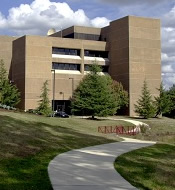
Environmental Factor, August 2007, National Institute of Environmental Health Sciences
Cancer Drug Researcher Is Upcoming Distinguished Lecturer
By Eddy Ball
September 2007

On September 11, NIEHS will welcome Susan Cole, Ph.D., as the first speaker in the 2007-2008 Distinguished Lecture Series. Cole, who is the Bracken Chair in Genetics and Molecular Medicine at Ontario’s Queen's University, will speak on "The Complex Role of GSH in the Function of the MRP1 Drug and Organic Anion Transporter." Her lecture will be hosted by David Miller, Ph.D., senior investigator in the Laboratory of Pharmacology and Chemistry.
Cole is a professor in the departments of Pathology and Molecular Medicine and Pharmacology and Toxicology and conducts research in her lab at the Cancer Research Institute at Queen’s. She received her doctorate at the university and served a postdoctoral fellowship with NIH.
The central focus of Cole’s lab is the investigation of mechanisms of resistance to natural product drugs that may be relevant to lung cancer and other human tumors. By using in vitro selected drug resistant lung cancer cell lines as model systems, she and her colleagues have identified two novel forms of multi-drug resistance to drug therapy among cancer patients.
Cole studies a protein known as Multidrug Resistant Protein (MRP1). MRP1 confers resistance by pumping drugs out of cancer cells. The protein is also found in normal cells where it can act as a barrier to protect tissues from drugs or environmental toxins.
Cole’s lab has identified several types of drugs and environmental agents, including herbicides and tobacco related chemicals, that are transported by MRP1. She is interested in the molecular structure of MRP1 and the specific features of the protein that determine whether or not it will pump a particular drug or toxin. Cole is also investigating the way the protein and several of its most closely related homologs perform as efficient energy-dependent cellular efflux pumps of glutathione (GSH) and glucuronide conjugated xenobiotics (the so-called Phase III elimination step of drug metabolism).
The 2007-2008 NIEHS Distinguished Lecture Series continues in October with speakers scheduled each month from September 2007 to August 2008.
"Mouse Haplotype..." - previous story ![]()
![]() next story - "Extramural Update..."
next story - "Extramural Update..."
September 2007 Cover Page



